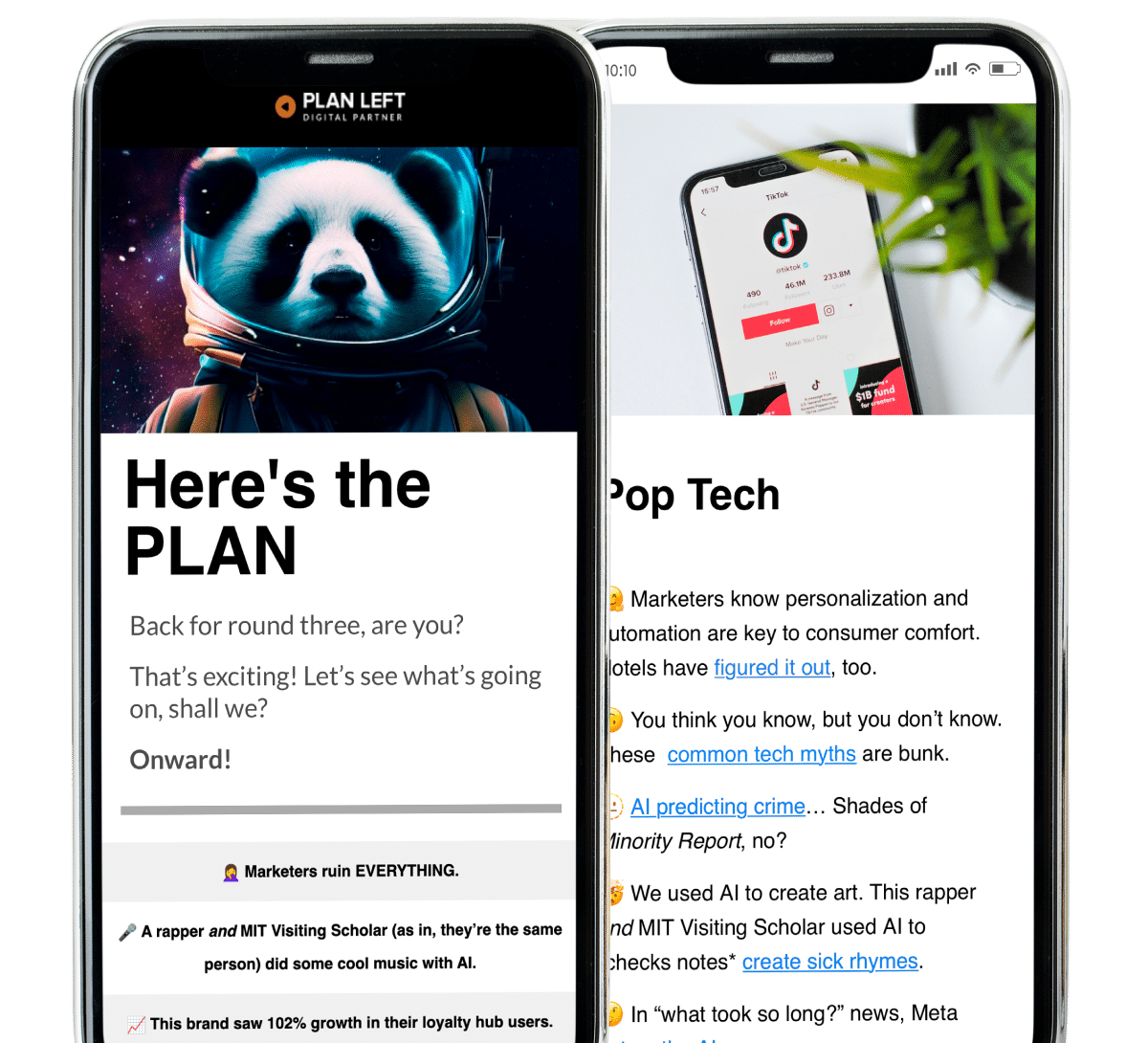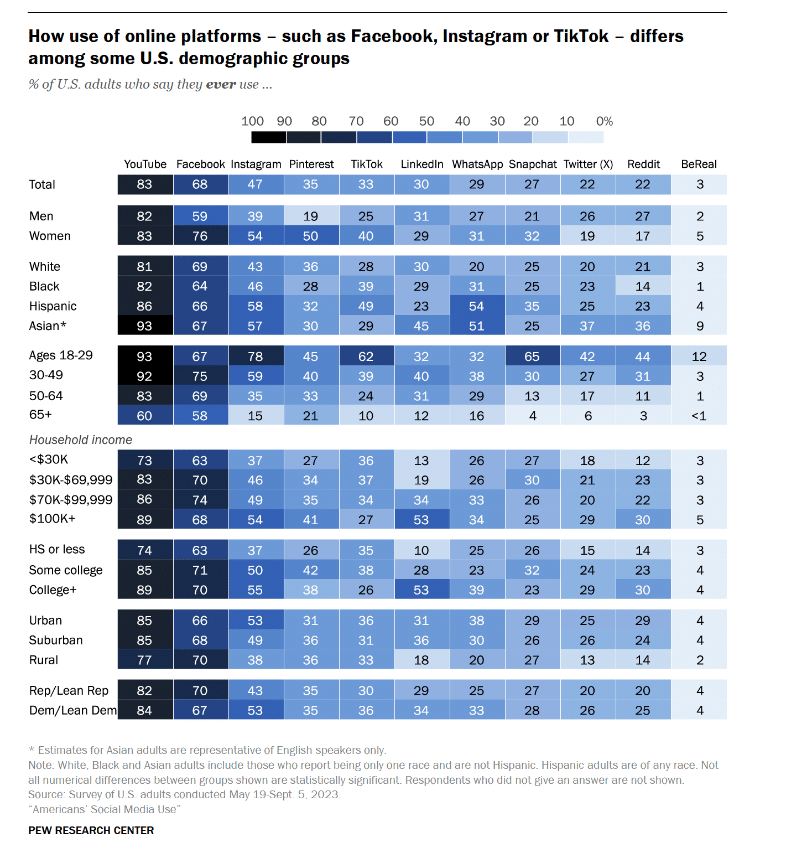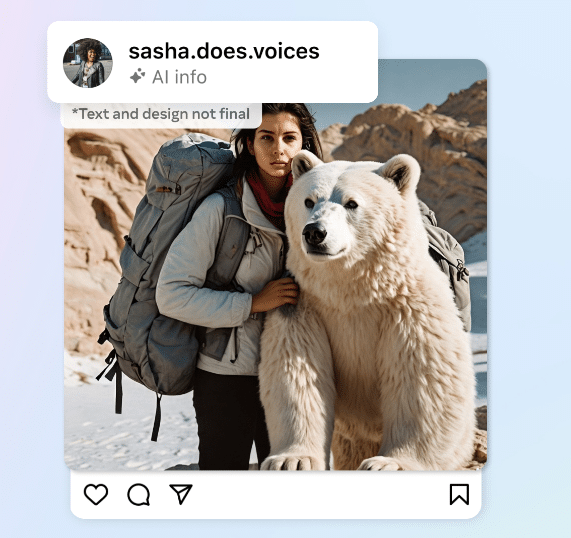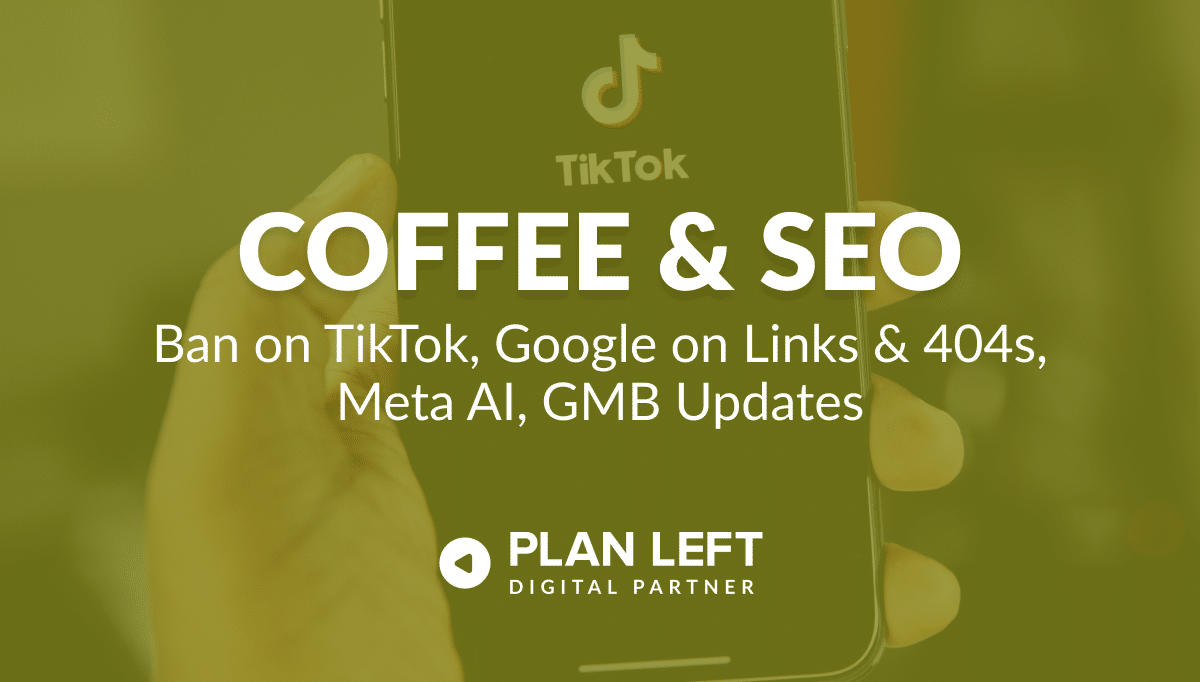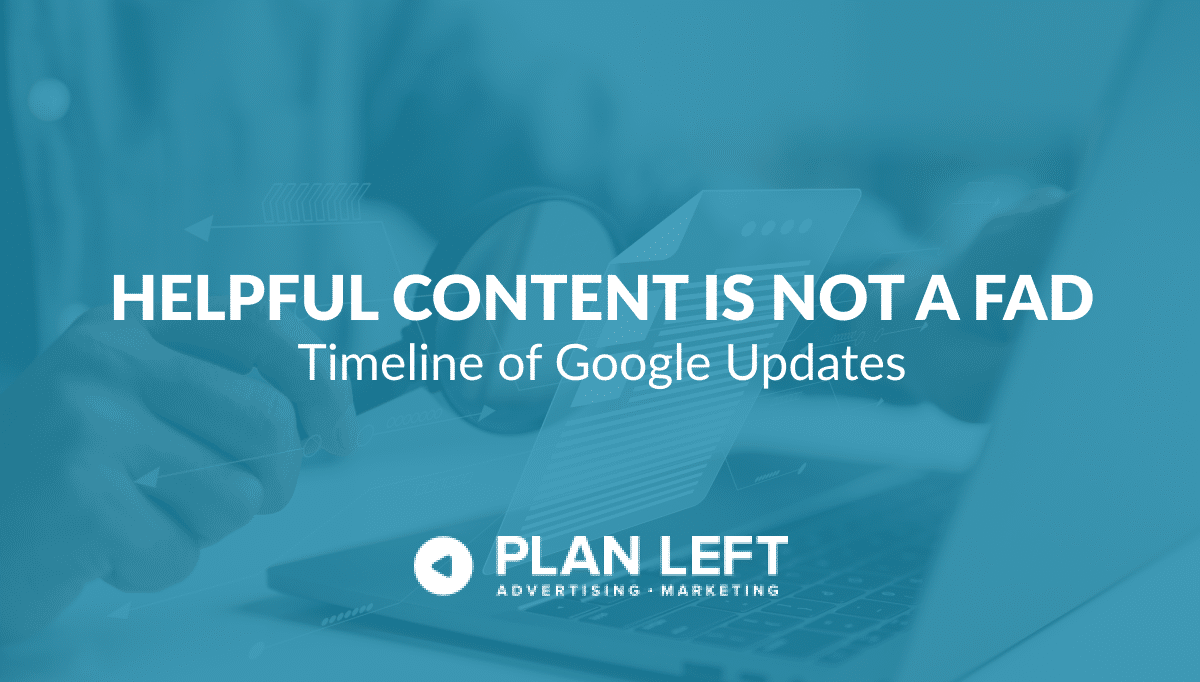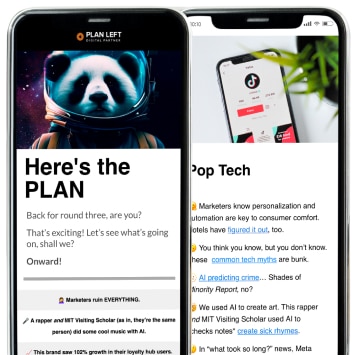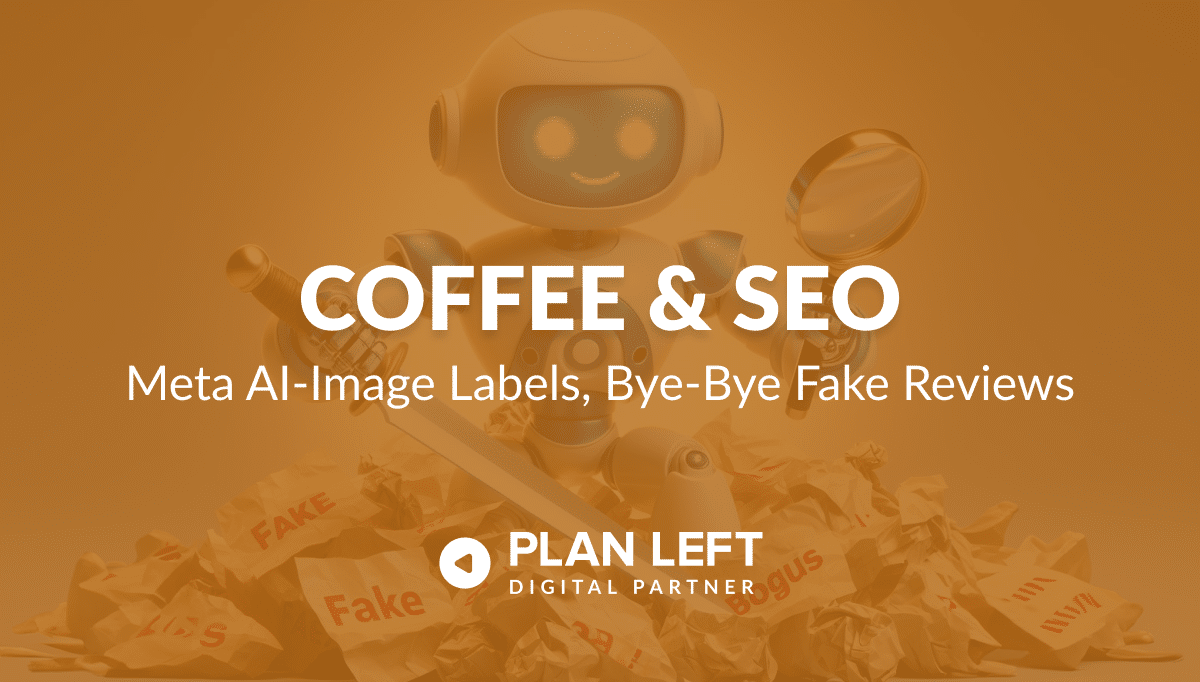
Sifting through the endless stream of content to find the nuggets of actionable insights can be daunting. And frankly, who has time for that? That’s where Coffee & SEO comes in. Our weekly updates cut through the clutter and deliver the need-to-know details straight to your inbox. We’ve got you covered, from Google’s latest Product Variant Schema Markup to fake review takedowns. So, if you’re ready to make informed decisions for your business with current data and insights, join us for this week’s update.
Americans Love TikTok – Marketers, Take Notes
If you haven’t prioritized your social strategy or updated it recently, you should. According to recent data from Pew Research Center, 72% of adults are active on at least one social media platform. TikTok has emerged as a dominant force among these platforms, particularly among Gen Z and Millennials. As reported by HubSpot, TikTok is also being used for search by Gen Z. Its short-form videos and dynamic community have propelled it into the spotlight, reshaping how users interact and engage online.
One standout detail from the research is the distinct age difference in user demographics across platforms. While Facebook remains popular among older adults, with 81% of those aged 50 to 64 using the platform, TikTok has captured the attention of younger generations, with 59% of those aged 18 to 29 actively engaged. This demographic divide underscores businesses’ importance in tailoring their marketing efforts to different audience segments based on their preferred social media platforms.
Image Source: Pew Research Center
For example, if you want to target males between the ages of 18 and 29, then Twitter is your sweet spot, with 26% of users male and 42% between the ages of 18 and 29. But if female users between the ages of 18 and 49 are your target, Pinterest is the place to be, with more than 50% of users female compared to 19% of male users.
TikTok’s rapid rise underscores the ever-evolving landscape of social media consumption habits. Since 2021, TikTok has grown by 21% in users, with 33% of adults now saying they use TikTok. This new data shows TikTok overshadowing platforms such as LinkedIn (30%), Twitter (22%), and Reddit (22%).
AI-Generated Images Labeled on Facebook, Instagram & Threads
Facebook’s recent announcement about labeling AI-generated images marks a shift in how social media platforms handle content transparency. The introduction of labels for AI-generated images on Facebook, Instagram, and Threads is a proactive step towards enhancing user trust and transparency.
This move comes as AI-generated content becomes increasingly prevalent across social media platforms. With advancements in Generative AI, the line between real and computer-generated imagery has become blurred, raising concerns about misinformation and authenticity. We’ve all been there asking, “Is this real, or is this AI?”
Facebook’s decision to label AI-generated images demonstrates its commitment to users’ awareness of the origin of the content they encounter online. By providing clear labels for AI-generated images, Facebook wants to empower users to make informed decisions about the content they engage with, fostering a more transparent and trustworthy online environment.
Image Source: Meta News
This initiative also highlights the growing importance of accountability and ethical considerations in developing and deploying AI technology. As AI plays a larger role in shaping our online experiences, it’s becoming more critical for platforms to prioritize transparency and user empowerment. If you or your client are using AI-generated images in ads and or social posts, this is something to be aware of, and also consider how the label may or may not impact your target audience.
A Statista survey in 2023 reported that those between the ages of 35 and 44 years old found AI-generated images to be appealing, and 12% of those between 18 and 34 years old found social media AI-generated images shared by influencers ‘extremely appealing.’ However, according to Pew Research Center, only 23% of adults in America trust how AI is used on social media platforms.
So use AI if that’s part of your workflow, but don’t make it the whole strategy. Keep organic, fresh images included so there’s a little something for everyone.
Google’s AI Expands to Product Suite
Google’s Gemini is changing the way users interact with Google’s products and services. By using natural language processing and machine learning techniques, Gemini is enhancing the conversational capabilities of Google’s virtual assistant, allowing for more fluid and intuitive interactions.
Google’s expansion of Gemini AI across its product suite further demonstrates the company’s dedication to integrating AI-driven solutions further into the Google ecosystem. From search to advertising, Google is leveraging AI to improve its platforms’ efficiency, relevance, and user satisfaction.
As businesses navigate AI integrations into everyday tools, embracing emerging technologies and updating strategy plans is essential. With more generative AI integrations like Gemini and CoPilot being used, GEO (Generative Engine Optimization) should be an integral part of any digital strategy. GEO uses AI to generate and enhance content in a way that resonates with your human audience, permitting businesses to stay ahead of the curve and deliver more relevant and engaging content to their audience. In turn, this creates more dynamic and engaging content that boosts rank.
This initiative aligns with Google’s broader goal to make information more accessible and useful to users worldwide. By harnessing the power of AI, Google is delivering more personalized and relevant experiences, enabling users to find what they need faster and more efficiently.
Google’s advancements in AI represent a significant step forward in shaping the future of technology and user experiences. By continuing to innovate and integrate AI-driven solutions like GEO with added statistics and citing sources into strategy and SEO best practices, there is no gap in marketing endeavors.
Hunting Down & Taking Out Fake Online Reviews with AI
Google’s taking a stand against fake reviews. Using AI to detect and address fake online reviews, Google is committed to maintaining the integrity of user-generated content. By leveraging advanced machine learning algorithms, Google is able to identify and remove fraudulent reviews more efficiently, thereby enhancing the credibility and reliability of online reviews.
Google’s approach to leveraging machine learning to keep contributed content helpful further demonstrates the company’s dedication to providing users with accurate and relevant information. By analyzing patterns and identifying anomalies in contributed content, Google will check that the information presented to users is reliable and trustworthy.
This is a huge win for business owners, marketers, SEO professionals, and others with a vested interest in legitimate reviews. But more, it’s a win for the 95% of users who use reviews to find their next purchase online. Having legitimate reviews will not only help ensure accurate brand awareness but also help mitigate the 97% of consumers who turn away from businesses based on the reviews they’ve read.
Google’s Content Partnerships with Reddit (and Maybe Quora)
If you have checked your SERP feed over the last year, you will have seen a lot of the results populating from Reddit and Quora. This makes Google’s recent $60 million dollar per year content partnership with Reddit and a possible deal with Quora not surprising. Google’s strategy is to enrich its search results with high-quality user-generated content. These partnerships allow Google to access a vast repository of knowledge and insights from Reddit’s community, which will grossly improve users’ search results’ relevance and depth.
The agreement between Google and Reddit enables the integration of Reddit content, including user-generated posts and discussions, into Google’s search results. This collaboration continues to open up new opportunities for users to discover valuable information and insights shared by Reddit’s diverse community of users.
With Google’s incorporation of TikTok content into its search results, Google is already providing users with more multimedia content to explore. These content partnerships align with Google organizing information to make it universally accessible and useful. By tapping into the expansive amount of knowledge and expertise available on platforms like Reddit, Quora, and TikTok, Google offers users a more comprehensive and insightful search experience.
And, with social media holding more influence over consumer behaviors, we should expect to see more of these partnerships in the future. A friend’s post on social media can influence the purchasing decisions of 80% of consumers. In addition to that, 75% use social media as a research tool when considering products and services. So, it would stand to reason that Google (the godfather of search) would want to tap into that.
Watercooler Highlights
There’s more — there’s always more. But we couldn’t leave out Google’s new schema markup for product variants or Bing’s new opinion label. For content built around product sales or blog content that’s more opinionated than data and facts, you don’t want to miss these.
Search Result Transparency With Bing’s Opinion Labels
Bing’s introduction of opinion labels in its search results is a step toward enhancing transparency and credibility in online search. The addition of opinion labels allows Bing to differentiate between factual information and subjective opinions, providing users with greater clarity and context when browsing search results.
Opinion labels are designed to help users identify and evaluate subjective content, such as:
- Opinion articles
- Blog posts
- Forum discussions
By transparently distinguishing between factual information and opinions, Bing enhances the credibility of its search platform and helps users navigate online content more effectively.
Google’s New Schema Markup for Product Variants
Google has a new schema markup feature designed to enhance the visibility and understanding of product variants in search results. This new markup, known as “product variants,” allows website owners to provide more detailed information about different variations of their products, such as size, color, and material.
Website owners and digital marketers can improve the visibility and relevance of product listings in search results by integrating these product variants. This enhanced visibility allows users to find and compare specific product variations more easily, leading to a better overall shopping experience.
The product variants markup also enables Google to display richer product information directly in search results, including details such as price, availability, and ratings for each variant. This gives users more information to make informed purchasing decisions without having to visit every. individual. product. page.
When the user has the information they want in the search results, and it’s accurately displayed with color, size, price, etc., then they will know what they are clicking into is what they are looking for, not clicking into the page, filtering, trying alternative searches, and ultimately exiting out to look elsewhere. This translates to a happier consumer and lower bounce rates for those of us who are data-obsessed (raises hand).
Coffee & SEO is here to distill the complexities of updated trends into actionable insights. We’ve got you covered, from unraveling social media behavior data to shedding light on the AI image labels. Reach out to Plan Left and start making informed decisions that drive your business forward.
Explore Latest Posts
Since the last round of Core and Spam updates knocked nearly 40% of websites out of Google’s search index, it ... read more
April 26, 2024
Google says the quality of your webpage is a ranking factor, but what is ‘quality’ according to Google? That would ... read more
April 19, 2024
In 2011, Google first changed how content was written with the Panda Update by changing how keywords could be used ... read more
April 17, 2024
MARKETING insights
Join the Thousands Who Receive Our Twice-Monthly Newsletter.
It's hard to keep up. Our newsletter is packed with buyer behavior insights, the latest marketing and technology updates, work/life balance tips, and—because we ❤️ our support staff—adorable pets looking for forever homes. Only twice per month. No clogged inboxes. You can't say no.
